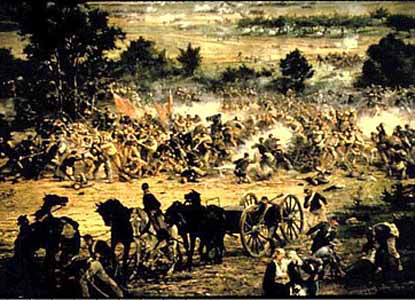 |
| Pickett's Charge |
GENERAL ORDERS,
HEADQUARTERS HOOD'S CORPS,
Numbers 36.
Dalton, March 7, 1864.
I. The attention of division and brigade commanders is called to the evil results that may follow from their officers and men having wrong impressions in regard to being flanked by the enemy; much care should be taken to instruct them in this matter.
II. A division commander occupying the extreme flank of a line of battle should, if attacked on the extreme flank, change front of such portion of his line as may be necessary to repel it and promptly notify the corps commander, that assistance may be sent him. In like manner a brigade commander, if thus attacked, should change the front of one or more of his regiments, promptly notifying the division commander, that he may make the necessary dispositions and communicate the facts ot the corps commander.
III. The importance of holding all ground taken from the enemy cannot be overestimated, as to relinquish it invariably demoralizes not only the troops immediately engaged but all others cognizant of the fact, and hence troops should never retire from the field for any purpose whatever, even to replenish ammunition (much of which can be obtained form our own and the enemy's wounded and dead), without authority from the corps and division commanders; as to do so would be second only to withdrawing without having fired a shot.
IV. Firing on the enemy at long range should never be permitted, since its lack of effectiveness often gives encouragement instead of causing demoralization, as a well-directed fire at short range is certain to do. In receiving an attack the enemy should be held until it can be delivered with deadly effect, and, if practicable, should be followed by a determined charge, as it is all-important to break the enemy's line, not merely for the encouragement if gives our men but the demoralization and confusion that it forces upon him. Every officer and man should understand that in long-range fighting the Yankees are our equals, but at close quarters we are vastly superior to them. The history of the war abundantly proves that they have never repulsed a determined and well-sustained charge.
V. Another point to be observed in making an attack is that the troops when advancing in line of battle should not be moved at the double-quick or in any way be fatigued before engaging the enemy, that they may be in the best possible condition for pressing him and improving any advantages which may be gained.
By command of Lieutenant-General Hood:
ARCHER ANDERSON,
Assistant Adjutant-General.
Official Records, Series I., Vol. 32, Part 3, Page 593.
Hood's directives are an interesting exposition on Civil War infantry tactics. He was no doubt correct that long distance firing produced little result, but his observation that "they (Union troops) have never repulsed a determined and well-sustained charge." is more than a bit ironic coming after Gettysburg. Nevertheless, Hood was correct in devoting his attention to how to respond to a flanking movement. The biggest danger was often not the movement itself, but the tendency of troops to fly rather than fight when flanked. His remarks on holding all ground taken also well reflect the psychology of battle. Hood, by reputation, was bold in combat and some would say overly so. But these orders are interesting in that they reflect the importance of sustaining attacks once delivered.
No comments:
Post a Comment